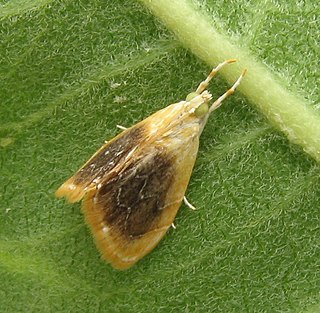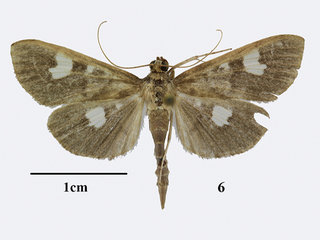
Pyraustinae is a large subfamily of the lepidopteran family Crambidae, the crambid snout moths. It currently includes about 1,280 species Most of them tropical but some found in temperate regions including both North America and Europe.

Spilomelinae is a very species-rich subfamily of the lepidopteran family Crambidae, the crambid snout moths. With 4,135 described species in 344 genera worldwide, it is the most speciose group among pyraloids.

Herpetogramma pertextalis, commonly known as the bold-feathered grass moth, is a species of moth of the family Crambidae. It was first described by Julius Lederer in 1863 and is found in North America.

Apamea cariosa, commonly called the nondescript dagger moth, is a moth of the family Noctuidae. It is found in the northeastern United States, including New York, Maryland, Indiana and Virginia. In Canada it is found in Ontario, Quebec, New Brunswick, Alberta, and Manitoba.

Glaphyria fulminalis, the black-patched glaphyria, is a species of moth of the family Crambidae described by Julius Lederer in 1863. It is found in the eastern part of the United States, from Connecticut to Florida, west to Texas and Illinois.

Parotis suralis is a moth of the family Crambidae. The species was first described by Julius Lederer in 1863. It is found around the west Pacific Rim, including the Chagos Islands, Hong Kong, Japan, Kiribati, Tuvalu and the tropical far north of Queensland.

Omphalocera is a genus of snout moths. It was described by Julius Lederer in 1863.
Omphalocera occidentalis is a species of snout moth in the genus Omphalocera. It was described by William Barnes and Foster Hendrickson Benjamin in 1924 and is known from the US states of Nevada, Arizona and New Mexico.

Glaphyriinae is a subfamily of the lepidopteran family Crambidae. It was described by William Trowbridge Merrifield Forbes in 1923. The subfamily currently comprises 509 species in 75 genera.
Dichogama redtenbacheri, the caper-leaf webworm moth, is a moth in the family Crambidae. It was described by Julius Lederer in 1863. It is found in Florida, the West Indies, Costa Rica and South America.
Crocidophora pustuliferalis is a moth in the family Crambidae. It was described by Julius Lederer in 1863. It is found in North America, where it has been recorded from Alabama, Arkansas, Florida, Indiana, Maryland, New Mexico, North Carolina, Oklahoma and South Carolina.

Crocidophora tuberculalis, the pale-winged crocidiphora moth, is a moth in the family Crambidae. It was described by Julius Lederer in 1863. It is found in North America, where it has been recorded from Alabama, Florida, Georgia, Illinois, Indiana, Maine, Maryland, Massachusetts, Mississippi, New Hampshire, North Carolina, Ohio, Oklahoma, Ontario, Quebec, South Carolina, Tennessee, Texas, Virginia, West Virginia and Wisconsin.
Ostrinia obumbratalis, the smartweed borer, is a moth in the family Crambidae. It was described by Julius Lederer in 1863. It is found in North America, where it has been recorded from New Brunswick and Manitoba to Louisiana and Florida.

Saucrobotys futilalis, the dogbane saucrobotys moth, is a moth in the family Crambidae. It was described by Julius Lederer in 1863. It is found in North America, where it has been recorded from the north-east to British Columbia and south to Texas and California.

Pilocrocis ramentalis, commonly known as the scraped pilocrocis moth, is a species of moth in the family Crambidae. It was described by Julius Lederer in 1863. It is found in North America, where it has been recorded from Ontario to Florida and from Wisconsin to Texas. Further south. it is found in Mexico, Honduras, Costa Rica, Cuba and Puerto Rico. It is an introduced species on the Galápagos Islands. The habitat consists of open woods, clearings and damp areas.
Pterotaea cariosa is a species of geometrid moth in the family Geometridae. It is found in North America.

Agroterini is a tribe of the species-rich subfamily Spilomelinae in the pyraloid moth family Crambidae. The tribe was erected by Alexandre Noël Charles Acloque in 1897.

Margaroniini is a tribe of the species-rich subfamily Spilomelinae in the pyraloid moth family Crambidae. The tribe was erected by Charles Swinhoe and Everard Charles Cotes in 1889, originally as family Margaronidae.

Asciodini is a tribe of the species-rich subfamily Spilomelinae in the pyraloid moth family Crambidae. The tribe was erected by Richard Mally, James E. Hayden, Christoph Neinhuis, Bjarte H. Jordal and Matthias Nuss in 2019.

Steniini is a tribe of the species-rich subfamily Spilomelinae in the pyraloid moth family Crambidae. The tribe was erected by Achille Guenée in 1854.














